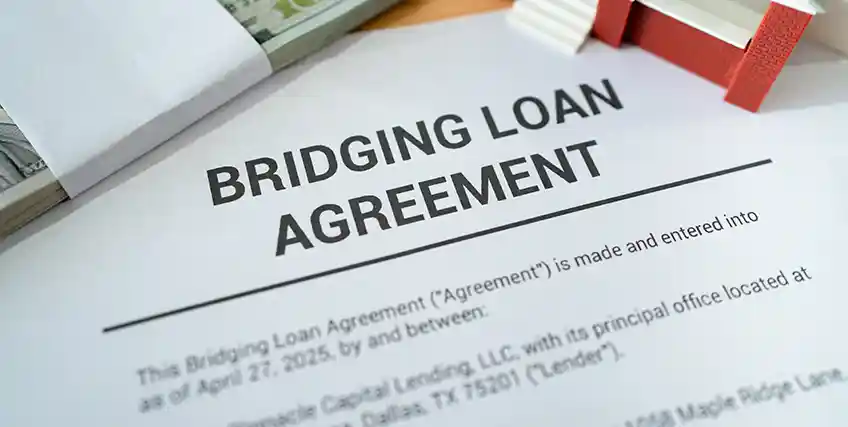Why Bridge Financing in Real Estate Might Be Your Best Bet in 2026
December 16, 2025 | Last Updated on: December 16, 2025

The real estate market in 2025 is moving at full speed. Buyers are acting fast, and properties are closing quicker than ever. With this speed, traditional loans can’t always keep up.
Bridge financing in real estate is a flexible, short-term financing option that fills urgent funding gaps and gives small business owners an edge. This financing option is especially useful for small business owners who can’t afford delays.
In this article, you’ll learn how bridge financing in real estate works, who should consider them, and tips to consider before choosing a bridge loan. We’ll also explore why these might be the smartest move in today’s market.
Why Timing Matters More Than Ever
In today’s hot real estate markets, delayed financing can cost you your dream home or office. Sellers often expect fast and clean offers. As a result, buyers need quicker financing solutions more than ever.
When it comes to real estate transactions, speed is an essential factor. Missed opportunities can often cost both time and profit. That’s why many borrowers are turning to bridge financing in real estate.
Bridge loans provide quick access to funds and fill the gaps between two office or retail locations. Hence, this fast access to capital helps you act with confidence and without compromise.
What is Bridge Financing in Real Estate
A bridge loan, also known as a swing loan, is a short-term loan that helps you “bridge” a funding gap. It offers a lump sum to buy a new property before the previous one is sold.
Unlike conventional mortgage loans, this gap financing gives you quick access to funds. This financing solution is ideal when your business is ready to move to a better facility, but capital is tied up in a property still on the market.
Bridge Financing in real estate is typically:
- Secured by equity in a commercial asset.
- Used by small business owners and commercial borrowers.
- Designed for 6-36 months to manage transition phases.
Small business owners often use bridge financing in real estate over conventional loans to gain control of important commercial properties. These can be storefronts, offices, or rental assets. A bridge loan works by offering closing costs for these properties before someone else does.
Additionally, some borrowers even refinance these properties later into long-term financing, once their existing space is sold, or business revenue stabilizes.
How Bridge Financing in Real Estate Works
It’s important to understand how bridge financing in real estate applies to small business needs. Real estate bridge loan lenders offer this financing solution to business owners to manage property transitions, secure high-demand locations, or fund upgrades without disrupting operations.
Let’s see how this bridge financing works for small business owners.
- If you’re a cafe owner, you can use bridge loans to find a perfect new property in a high-traffic location.
- If your current commercial space hasn’t been sold yet, you can buy a new one using commercial property bridge loans.
- You can apply for a bridge loan from commercial real estate bridge loan lenders.
- The loan amount offered through bridge loans is based on equity, credit score, and debt-to-income ratio (DTI).
- You can use the capital to cover your down payment, upgrade the new space, or settle outstanding obligations.
However, many lenders offer interest-only payments during the term to preserve your cash flow. Once your old property is sold, repayments can be made.
Additionally, small business owners use bridge financing in real estate as a path to refinancing at a later stage. This helps them to lower mortgage rates or go for long-term financing.
Why 2025 Is a Good Year for Bridge Financing in Real Estate
In 2025, business decisions move fast, especially in commercial real estate. This speed often puts pressure on small business owners to make rapid decisions and secure funding without delays.
Here are the ways why bridge financing in real estate is a strong choice for the U.S. business owners over traditional mortgage.
- Mortgage lenders are typically slower due to stricter regulations, underwriting delays, and internal approval delays.
- Sale contingencies often weaken offers, making it difficult to compete in high-demand markets.
- Commercial property bridge loans use is growing as business owners prioritize fast closings and flexibility over long-term mortgage payments.
The commercial real estate market continues to favor buyers who act quickly and decisively. Hence, traditional financing methods can’t always match that speed. Buyers submit offers without contingencies, securing premium spaces with limited competition.
Bridge loans in real estate offer the speed and agility needed to win those deals. They give small business owners the ability to relocate, expand operations, or acquire prime locations without missing out.
Why Business Owners Use Bridge Financing for Real Estate
Small business owners who are involved in property management, real estate investing, or location-based operations often find bridge financing beneficial. Here are some advantages of using it for business needs.
Jump On New Locations
Timing is everything in commercial real estate. A bridge loan allows business owners to move quickly to ideal locations before their competitors. This immediate funding can make a lot of difference between winning and losing a crucial space due to limited inventory and rising competition.
Maintain Operations Smoothly
Small business owners can now relocate or expand their businesses easily without disrupting day-to-day operations. Bridge financing helps you make the transition without halting your business. It provides capital during the in-between stage, so you can continue running your business without worrying about cash gaps.
Improve Flexibility with Equity
Business owners often have equity tied up in commercial properties. Bridge loans let you unlock that equity without delays of traditional refinancing. Unlike credit cards or personal loans, these swing loans are backed by your real estate assets, offering better terms and higher limits.
Reduce Dependency on Traditional Lenders
Traditional loan lenders can take weeks or even months to process funding. However, in real estate, deals require a fast closing. Bridge financing for real estate gives you the power to bypass those delays and act immediately.
Support Expansion During Growth
Rapid growth of your business involves moving into new territories or scaling infrastructure. Bridge loans help business owners expand their businesses without putting everything else on hold. They can acquire multiple properties, invest in renovations, or respond to demand as it rises.
Flexible Payment Structure
Bridge financing in real estate offers interest-only payments. This helps in preserving cash during critical stages of your transition. This flexibility is particularly helpful for businesses juggling operational expenses while managing new acquisitions. Also, it ensures smoother financial planning without burdening you with monthly payments.
Who Should Consider Bridge Financing in Real Estate
Bridge loans aren’t just for real estate investors. They’re becoming increasingly valuable to a wide range of small business owners. From relocating a storefront to upgrading to a bigger warehouse, these loans can help navigate cash shortfalls that occur during expansion.
Bridge financing in real estate can be an ideal option if you're a small business owner and you:
- Are expanding to a second location.
- Need short-term capital to grab a high-value real estate deal.
- Want to relocate your business without interrupting cash flow.
Additionally, it is ideal for:
- Real estate investors: Working on tight timelines for acquisition and resale.
- Property managers: Handling multiple listings and needing fast capital for renovations or new listings.
- Retail entrepreneurs: Jumping on rare leasing or buying opportunities without delay.
Bridge loans help all of these business types to avoid slowdowns and continue scaling.
Tips to Consider Before Choosing Bridge Financing for Real Estate
Before you sign any agreement, take time to evaluate the people and institutions behind your funding. Trust matters, especially when timing and capital are on the line. Make sure you're working with lenders who have experience supporting businesses like yours.
Here are some tips to consider before choosing bridge financing.
- Check credentials of your lenders: Always work with licensed NMLS professionals. You can also choose experienced real estate bridge loan lenders.
- Know the cons of bridge loans: Theses loans come with higher interest rates, short terms, and strict underwriting. Therefore, understand your obligations clearly.
- Get your finances in order: Lenders will review your credit history, DTI, loan-to-value ratio, and overall revenue before approving bridge loans.
- Plan for repayment early: You can repay your bridge loan through the sale of your previous property, refinance, or business profits.
- Explore every financing solution: Before considering, compare bridge loans to business lines of credit, equipment financing, or cash-out refinance options.
- Keep monthly costs lean: Stick to what you need. Avoid overextending your loan amount or piling on unnecessary origination fees.
Conclusion
For U.S. small business owners operating in or around real estate, 2025 is not the year to delay. Markets are moving quickly, and waiting for traditional loans could mean losing valuable property.
Bridge financing in real estate provides the speed and flexibility you need to scale your business, secure strategic properties, or make smart upgrades. Whether you’re flipping commercial properties, managing rentals, or expanding your business footprint, bridge financing helps close the gap.
Ready to take your business to the next location? Partner with trusted bridge loan lenders today and move without missing a beat.
Frequently Asked Questions About Bridge Financing in Real Estate
What is a bridge loan and how can it help my business?
A bridge loan is a short-term financing option that helps cover funding gaps between property transactions. For small business owners, it can offer quick access to capital when the timing is tight. Also, it may be a helpful solution when you need to secure a new commercial property before selling an existing one.
Is bridge financing only for real estate investors?
While real estate investors often use bridge loans, small business owners across industries are turning to them too. They can be useful for relocating, expanding, or upgrading your operations. So, they might be worth considering if you need fast funding without long approval delays.
What makes bridge loans different from traditional business loans?
Bridge loans typically have shorter terms and faster processing compared to conventional loans. They are often secured by commercial assets and may involve interest-only payments. As a result, that structure could work well for businesses facing tight real estate timelines.
Are there any risks with using a bridge loan?
Like all financial tools, bridge loans come with some trade-offs. These may include higher interest rates, a short repayment window, or stricter lender requirements. Nevertheless, it's always a good idea to weigh the risks based on your business goals and repayment strategy.
How do I repay a bridge loan if my property doesn’t sell quickly?
If a sale takes longer than expected, refinancing or alternative repayment plans could help. Some businesses explore long-term financing options to settle the bridge loan. Therefore, it’s wise to plan your exit strategy early to reduce stress later.
Frequent searches leading to this page
Term Loans are made by Itria Ventures LLC or Cross River Bank, Member FDIC. This is not a deposit product. California residents: Itria Ventures LLC is licensed by the Department of Financial Protection and Innovation. Loans are made or arranged pursuant to California Financing Law License # 60DBO-35839




